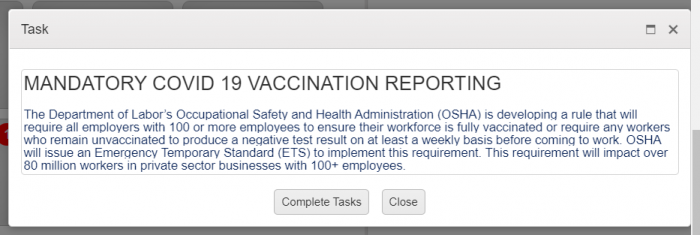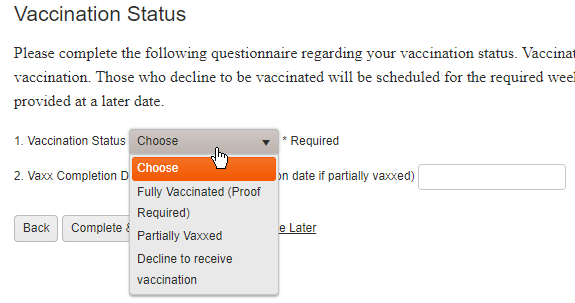
On September 9, President Joe Biden announced a new six-pronged approach the administration will undertake to further combat COVID-19. A key component of this new strategy is vaccine mandates for certain workers.
Wondering what this latest development means for your business and how you can comply? We’ve got you covered in this quick guide to understanding the vaccine mandate and its impact on your business.
Affected Employers
For starters, who needs to get vaccinated? As of the writing of this article, COVID-19 vaccine mandates apply to four specific groups of employers. These include:
- All Federal workers and contractors nationwide – required by Nov. 22, 2021
- Healthcare employees – deadline passed on Sept. 30, 2021 for California employees and is TBD for other states
- California school district employees – required by Oct. 15, 2021
- Large private employers (100+ employees) – deadline is TBD
Testing Options
While some affected employers have the flexibility to offer weekly testing options to employees who refuse the vaccine, this varies by situation. At this time, Federal workers and contractors as well as healthcare employees do not have the option to undergo weekly testing.
For employees in both of these groups to maintain employment, they must either be vaccinated or:
- Have a valid healthcare exemption from a physician, or
- Qualify for a religious exemption.
For school district employees, employee options are dependent upon the worker’s position. While some positions will be allowed to opt to undergo weekly testing, most of these workers will not.
Finally, employees of large private employers will have the greatest flexibility. As of the writing of this article, if unvaccinated, these employees will be able to continue their employment if they agree to undergo weekly testing.
Paid Time Off for Vaccinations
Now that you know whether or not your employees are subject to a vaccine mandate, the next question is, do I have to provide paid time off for employees to get vaccinated?
According to President Biden’s COVID-19 Action Plan, there is a paid time off requirement that will be added to OSHA’s Emergency Temporary Standards (ETS).
At this time, it is unclear whether the government or employers are footing the bill for this time off. Previously, ARPA paid leave included provisions for paid time off for COVID-19 vaccinations that was reimbursable to employers via a payroll tax credit. However, this expired on September 30, 2021.
Until OSHA updates its ETS, we will not know if a new government program will appear to replace it. But even if not, employers will be required to provide paid time off for employees to get vaccinated and recover.
Paid Time Off for Testing
Similarly, it is unclear whether employers will need to provide paid time off for testing of unvaccinated employees. Despite this ambiguity, there are steps your organization can take to minimize your costs once this requirement takes effect.
For example, you could opt to have your HR Manager oversee the entire process of coordinating testing for unvaccinated employees. Your Manager can go to the nearest free testing center’s website to schedule employee tests for the last 30 minutes of their shift. (Or another time that works best for your workplace!)
Because the center is close to your location, you avoid burdening employees with an undue hardship to get tested. And since you are coordinating the testing schedule, you can minimize the disruption to your workplace.
Tracking Vaccinations
Whether your business is subject to a vaccine mandate or not, we’d strongly recommend you have your HR department start tracking employee vaccination statuses. (If they aren’t already!)
Given state and federal precedent, requiring employee vaccination status disclosure is clearly within an employer’s rights. But beyond this, it’s also clearly in any employer’s best interest. Having this information allows you to make informed decisions in the event of a COVID-19 case, rather than being forced to shut down completely.
Top Tip: Consider offering free Starbucks gift cards to any employees who come see HR by a specified deadline to provide their vaccination status and proof of vaccination (if vaccinated) to quickly gather this information!
How SDP Connect Can Help
Okay, so we’ve covered whether or not your business should track vaccinations. Now it’s time to plan how. Fortunately, you can conduct this entire process from within your SDP Connect portal!
To start, you can inform employees of your new Vaccination Reporting requirement using Workflows.

Next, you can use the system to collect an employee’s Vaccination Status.

You can even prompt employees to upload their vaccination proof to the system. This will automatically store a copy of the proof in the employee’s “My Files” tab.

Finally, you can track employee progress and use our Report Writer to run custom reports off of this information.
![]()
What do you think?
Are you ready to comply with the new vaccine mandate? While we don’t know all the details yet, there are plenty of tasks your business can begin tackling now.
If you’d like to implement the tracking mechanisms mentioned in this article, then let’s talk! Tracking in SDP Connect is paperless, automated, and can significantly reduce the burden on your team. Plus, our HR Services Department is always available to answer any additional questions you may have.
Finally, don’t forget to follow us on Facebook, Twitter, and LinkedIn for even more business tips and news. We will be rolling out an all-new COVID-19 Vaccination module soon to streamline this process even further, so be sure to keep an eye out for updates!
Photo by RF._.studio from Pexels

